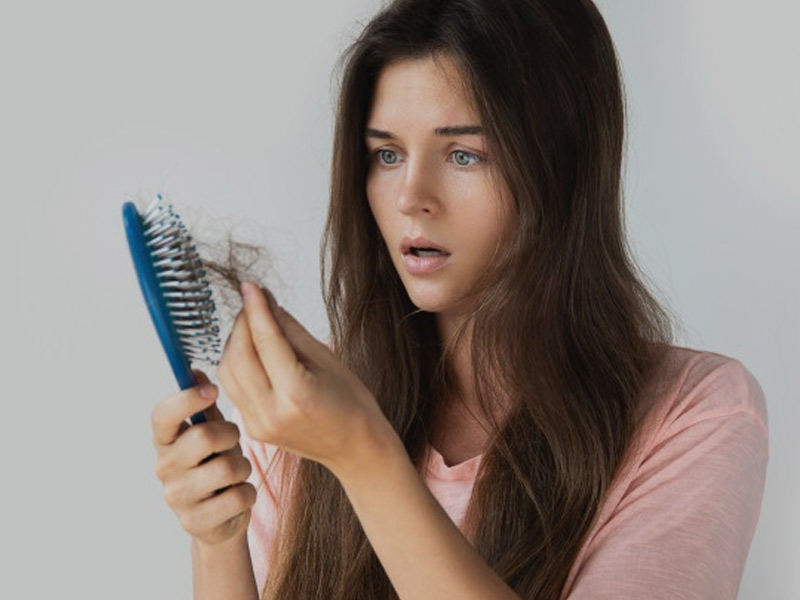
Seeing strands of hair on the comb, pillow, and bathroom floor, can be petrifying, especially if you experience it quite often. Although some amount of daily hair fall is normal, however, when it’s excessive, it can be a cause for concern. Hair is a crucial aspect of a person’s personality, and a receding hairline, bald patch, or thin hair, can have an impact on your confidence and self-esteem. Hence, if you, too, experience excessive hair fall, you can consider steps to prevent it. And, for that, knowing the cause can help. If your poor dietary intake is causing your hair to fall, then having a proper, nutritious, and well-balanced diet is what you need to do. Similarly, if the cause is stress, then you must consider relaxation techniques. The solution generally depends on the cause. Hence, to understand the possible causes of hair fall, Onlymyhealth spoke to Dr Bhavuk Mittal, Dermatology and Cosmetology, Manipal Hospital, Ghaziabad.
Table of Content:-
Common Causes Of Hair Fall

(Photo Credit: Freepik)
Hair health is generally connected with diet and hair hygiene, which is true. But these aren’t the only factors that determine the quality of your hair. Hence, multiple factors can contribute to hair fall, such as:
- Inadequate diet
- Hormonal abnormalities
- Genetic
- Stress
Nowadays, many people are also experiencing post-COVID-induced hair fall.
Also read: 8 Skin & Haircare Resolutions For 2022
Can Some Medical Conditions Cause Hair Fall?
Yes, there are diseases and health issues that can lead to hair fall. Post-COVID-induced hair fall is becoming more and more common. Other diseases and health issues that can lead to the same include:
- Hypothyroidism
- Diabetes
- Increased level of uric acid
- Deficiencies of vitamin D and B12
Stress And Hair fall

(Photo Credit: Freepik)
On this, Dr Mittal said that “nowadays, stress is a major contributor to hair fall.” Adding further, he said, stress does play a role, but this has been further exacerbated by COVID-19, which has led to a rise in mental health issues. Apart from stress, other lifestyle factors, such as inadequate diet and lack of sleep also contribute to hair fall.
Natural Ways To Manage Hair Fall
“The treatment for hair fall depends on the cause,” said Dr Mittal. If you want to manage hair fall naturally, there are simple dietary and lifestyle changes that you can make for the same, such as:
- For your hair to grow, you need amino acids in your diet, and the only source from where you can get these is protein. Hence, include lots of protein in your diet, such as soybean, eggs, meat, pulses, curd, milk, etc.
- As you saw, stress is a major contributor to hair fall, hence include activities in your lifestyle that help you beat it. Such activities include yoga, meditation, or your hobbies that help you relax.
Other than these, have an active lifestyle and sleep well.
When You Should See A Doctor
Hair fall of 50-60 strands a day is normal, said Dr Mittal. However, anything more than that especially after following a proper diet, managing stress, and having a proper lifestyle, can be problematic. Hence, in such a case, you must see a doctor. Also, if you suffer from any of the health issues such as diabetes, hypertension, hypothyroidism, have a deficiency, or suffer from stress, then you must see a doctor, as the dietary and lifestyle changes might not be enough.
Tips For Good Hair Health
A thing that you should know is that your hair health is a reflection of your overall health. Hence, for strong and healthy hair:
- Have a proper, well-balanced diet that is rich in protein. Also, eat a lot of seasonal fruits and vegetables.
- Stress management is crucial not just for your hair health, but for your overall physical and mental health, too. Hence, try relaxation techniques and include activities in your lifestyle that help you beat stress. Yoga and meditation can help you in this.
- Have an active lifestyle for which you should try to be physically active throughout the day.
- Sleep enough. Seven to eight hours of undisturbed sleep is generally recommended.
- Try to stay positive and happy.
Also read: Winter Special Hair Oil: Rujuta Diwekar’s Secret Hair Oil Recipe For Healthy Locks
Other than these, Dr Mittal recommends reducing screen time, especially during the night, as it can hamper your sleep, thus impacting your hair health. Also, you must consult a doctor if you suffer from hormonal imbalance. If you experience drug-induced hair fall, in that case, too, you must see an expert.
(With inputs from Dr Bhavuk Mittal, Dermatology and Cosmetology, Manipal Hospital, Ghaziabad)
Photo Credit: Freepik
Also watch this video
How we keep this article up to date:
We work with experts and keep a close eye on the latest in health and wellness. Whenever there is a new research or helpful information, we update our articles with accurate and useful advice.
Current Version